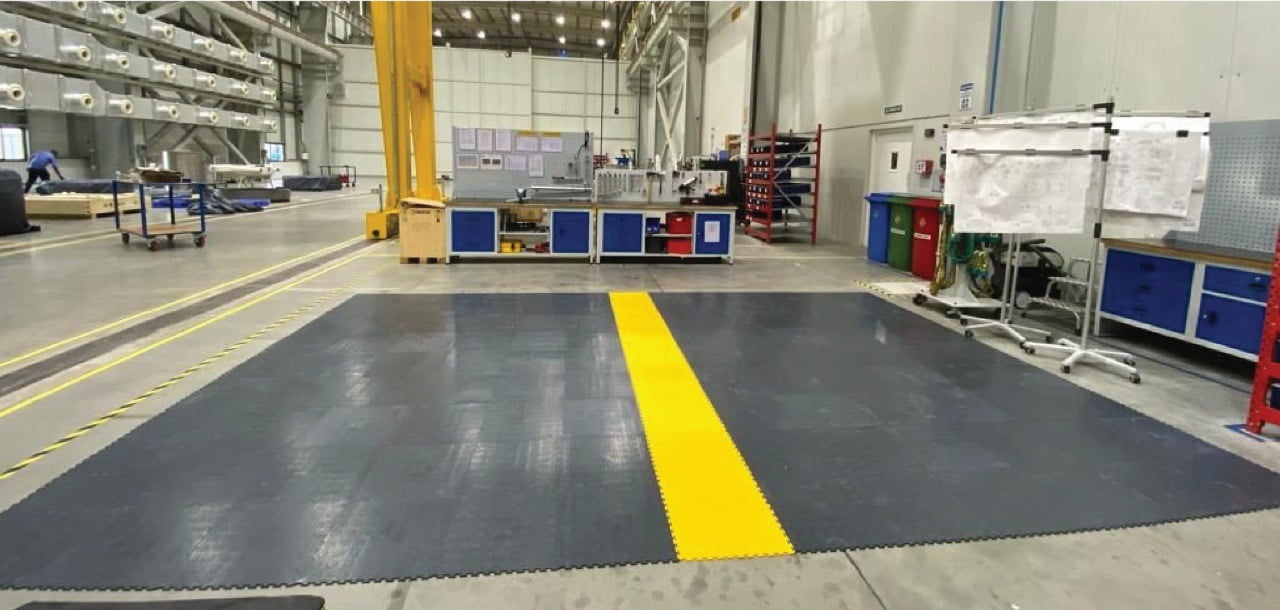Concrete vs. PVC Interlocking Floor Tiles: Which is Better for Heavy Machinery Environments?
Choosing the right flooring for industrial environments that handle heavy machinery is crucial. The choice can directly impact not only the employees’ safety but also the operations’ efficiency and effectiveness. Today, we will delve deep into why Camp Manufacturing‘s PVC Interlocking Floor Tiles stand out as the clear winner compared to traditional concrete flooring.
Durability and Strength
Concrete Floors
Concrete has been a long-standing champion in the industry, primarily due to its strength and ability to withstand a reasonable amount of weight. However, this is not without its limitations. Concrete is highly susceptible to cracks, especially under continuous stress from heavy machinery. Furthermore, even minor wear and tear can become noticeable, requiring frequent and costly maintenance.
Alt Text: “Cracks appearing on concrete flooring under the stress of heavy machinery.”
PVC Interlocking Floor Tiles by Camp Manufacturing
Enter PVC Interlocking Floor Tiles by Camp Manufacturing—a revolutionary product designed to withstand the challenges of modern industrial settings. Built for heavy-duty usage, these tiles exhibit high mechanical resistance, almost immune to the usual wear and tear that affects concrete floors. Their longevity makes them a cost-effective solution for industrial settings, rendering the frequency of replacements significantly lower than their concrete counterparts.
Alt Text: “Workers efficiently installing Industrial Floor Tiles in an industrial setting.”
Ease of Installation
Concrete Floors
The process of installing concrete floors is cumbersome and time-consuming. It involves multiple stages such as preparation, mixing, pouring, levelling, setting, and curing, taking several days to weeks to complete. Each stage also necessitates the expertise of skilled labourers, driving up costs and extending project timelines.
PVC Interlocking Floor Tiles
On the other hand, Camp Manufacturing’s PVC Interlocking Floor Tiles come with a revolutionary quick-lock mechanism inspired by designs like Fortelock and Tiepro, which simplifies the entire installation process. Gone are the days of waiting for the floor to set or cure. A small team can install these tiles in a fraction of the time without compromising on quality or structural integrity. This speed also minimises disruption to your operations, a feature invaluable in high-stakes industrial settings.
Maintenance Needs
Concrete Floors
Concrete requires consistent and meticulous maintenance. This often involves sealing cracks, buffing, and sometimes, even full-scale replacements—activities that are both time-consuming and costly.
Alt Text: “Worker sealing cracks on concrete flooring, highlighting the high maintenance needs.”
PVC Interlocking Floor Tiles
Regarding maintenance, Camp Manufacturing’s PVC Interlocking Floor Tiles are almost self-sufficient. These tiles need little more than a regular sweep and occasional mopping, drastically reducing upkeep costs and time.
Alt Text: “Finished installation of PVC Interlocking Floor Tiles, showcasing their aesthetic appeal and professional finish.”
Cost-Efficiency
Concrete floors, despite their apparent low, upfront cost, can be deceptively expensive when you factor in maintenance, repair, and labour costs. Camp Manufacturing’s Heavy Duty Industrial Floor Tiles offer unparalleled cost-efficiency. While the initial investment might be comparable or slightly higher, these tiles’ low maintenance and long lifespan offer a return on investment that concrete simply can’t match.
Safety Features
Concrete Floors
Safety is another area where concrete flooring falls behind. Although seemingly sturdy, the material becomes slippery when wet, and its tendency to crack and chip poses a considerable hazard in industrial settings.
PVC Interlocking Floor Tiles
Camp Manufacturing puts a premium on safety. These PVC tiles are designed to be slip-resistant and are engineered to offer an even surface. The risk of industrial accidents, such as slips, trips, and falls, is markedly reduced—making them the go-to option for environments dealing with heavy machinery.
Environmental Concerns
As businesses move towards sustainability, it’s essential to consider the environmental impact of your flooring. Concrete is not exceptionally eco-friendly. The material is not recyclable and contributes to CO2 emissions. In contrast, Camp Manufacturing’s PVC tiles are being produced with a keen eye on sustainability, offering an environmentally responsible choice.
Conclusion
If durability, efficiency, and safety are your top priorities, look no further than Camp Manufacturing’s PVC Interlocking Floor Tiles. Offering many advantages over traditional concrete floors, they are a testament to what modern manufacturing technology can achieve.
FAQs
How durable are Camp Manufacturing’s PVC Interlocking Floor Tiles compared to concrete?
Exceptionally durable. Designed to withstand industrial-grade stress, they outlast concrete floors by years.
Is the installation of PVC tiles complex?
Far from it. The interlocking mechanism simplifies the process, drastically reducing time and labour costs.
What about long-term costs?
While concrete may seem cheaper initially, the long-term maintenance costs make PVC tiles by Camp Manufacturing a more cost-effective choice.
Are these tiles eco-friendly?
Yes, Camp Manufacturing focuses on sustainable production methods, making them an eco-conscious choice.
How do these tiles improve workplace safety?
These tiles are slip-resistant and offer an even surface, reducing the chances of industrial accidents.

